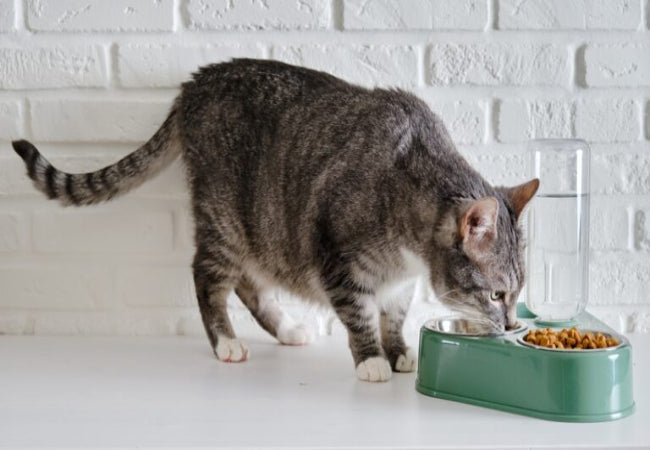Feeding Senior Cats Naturally 2025: Vet Tips for Energy & Organ Support 🐱✨

In this article
Feeding Senior Cats Naturally 2025: Vet Tips for Energy & Organ Support 🐱✨
By Dr. Duncan Houston BVSc
As cats age, their metabolism slows, digestion shifts, and common issues like kidney disease or dental problems creep in. But with the right natural diet, older cats can stay active, lean, and purring well into their golden years.
I’m Dr. Duncan Houston, veterinarian and founder of Ask A Vet. Here’s how to feed your senior cat naturally—with real food, hydration, and age-appropriate support—to maintain vitality and prevent decline.
📆 When Is a Cat Considered “Senior”?
- Most cats are considered seniors at age 10–11
- Age 7+ = “mature,” age 14+ = “geriatric”
- Needs vary depending on energy level, muscle mass, and disease risk
✅ Natural Feeding Goals for Senior Cats
- Preserve lean muscle (high-quality protein)
- Support kidneys and hydration (high-moisture diet)
- Ease digestion (gentle, soft foods + enzymes)
- Protect joints, cognition, and immunity with supplements
🍽️ Best Foods for Senior Cats (Natural & Soft)
1. Moist, Cooked or Gently Raw Meals
- Turkey, rabbit, lamb, white fish—cooked or raw (balanced)
- Avoid hard dry kibble if teeth or appetite decline
2. Easy Fiber & Gut Support
- 1 tsp pumpkin or mashed zucchini per day for gentle fiber
- Add probiotics and digestive enzymes at mealtime
3. Omega-3s & Brain Boosters
- Fish oil (EPA/DHA) to reduce inflammation and support cognition
- Vitamin E + B-complex for nerve and immune support
4. Kidney-Support Additions
- Bone broth, water-soaked food, or goat milk for hydration
- Low-phosphorus protein options (egg whites, turkey)
📋 Sample Senior-Friendly Natural Meal
- Cooked turkey mince
- Mashed pumpkin + zucchini (1 tbsp total)
- ¼ tsp sardine oil + probiotic + warm water
🛑 What to Avoid
- High-phosphorus foods (like organ meat or fish daily)
- Hard kibble (difficult to chew, low moisture)
- Raw bones (risk of tooth fracture or blockage)
🧠 Feeding Tips for Aging Cats
- Serve food slightly warmed to increase aroma and palatability
- Feed smaller, more frequent meals (2–3/day)
- Monitor appetite, stool, and hydration weekly
- Use shallow bowls or elevated feeders for stiff joints
🔗 Tools from & Ask A Vet
- Ask A Vet – Upload diet logs, health concerns, and get a senior cat feeding plan built by a vet
📋 Summary Excerpt
Senior cats need high-quality protein, hydration, and gentle food for aging digestion. A vet explains how to support older cats naturally through food, supplements, and feeding strategies that promote energy and comfort.
❓ FAQs
-
Q: Should senior cats eat less protein?
A: No—older cats need more** high-quality protein to prevent muscle loss. But it should be easy to digest and low in phosphorus if kidney disease is present. -
Q: What if my senior cat won’t eat?
A: Warm the food slightly, offer multiple small meals, and try soft textures. Appetite loss may also indicate dental or organ issues—consult a vet. -
Q: Is raw food safe for older cats?
A: Yes—if balanced and well-tolerated. Gently cooked diets are often easier to digest and safer for cats with reduced immune resilience.






